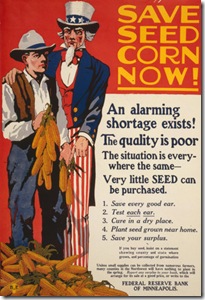While "sustainability" is being chanted everywhere like a mantra at a Hare Krishna ashram, at the same time some people still insist on calling government spending on so called infrastructure 'investment.'
It isn't. It's neither sustainable, nor investment.
 If sustainability means anything at all then it's this old Native American credo recycled by Dr Seuss: Don't eat your seed corn. Or, in other words, don't consume your assets without renewing them. Once you do that then you're sunk. But, as George Reisman points out, this is precisely what government 'investment' does. It does not produce, it consumes.
If sustainability means anything at all then it's this old Native American credo recycled by Dr Seuss: Don't eat your seed corn. Or, in other words, don't consume your assets without renewing them. Once you do that then you're sunk. But, as George Reisman points out, this is precisely what government 'investment' does. It does not produce, it consumes.
You see, when a businessman invests in goods or assets, he expects to make sales from these assets sufficient to replace them, and more. He expects to recoup his expenditure, with a bit left over besides. In other words, sales made on the basis of these assets makes possible their own replacement when they are physically consumed. It is reproductively employed. Not only does the businessmen not eat his seed corn, he ensures the continuing replacement of his asset. This is at root what it means to invest, and this process of investment and growth and reinvestment is in fact the basis of all physical production. This is how we make ourselves rich -- sustainably rich.
When a restaurant buys roast beef for example, on which it plans to make a profit by selling dinners, or a laundry buys a new washing machine on which it plans to make money by washing people's clothes, these represent investments in producer goods, an investment which the producer intends to recoup -- which means (all going well) that the producer is self-sustaining.
Not so the purchase of consumer goods. If your flat were to buy roast beef for your evening meal or that washing machine to keep your clothes clean, then whatever is consumed in the meal or the washing process (and every use consumes some part of the asset) is gone for good. It is consumed. These same goods when used by consumers to consume are consumer goods, which are destructively employed. Unlike producer goods, they disappear with use.
Now, governments are not producers: they are consumers. They are not self-sustaining: they are parasitical. In other words: government does not invest, it consumes. Hence only private businesses can be described as self-sustaining, since only the activity of private businesses is so designed as to recoup its investment in assets, and therefore to preserve its 'seed corn.'
Put bluntly, all that a government produces requires consuming the production of others; all the assets in which it 'invests' are at best only consumptive production that is dependent on mooching off real producers. Without this mooching, every government asset is on the road to disappearing without a trace. Concludes Reisman:
In the same sense as a housewife, the government is not a producer but a consumer, who is dependent upon producers. All of its physical production, like hers, is in the last analysis a consumptive production. It is a production which cannot replace the means with which it began ... a production which leaves the government poorer by the amount of funds it has expended. In order to continue the activity, resort must be had to an external source of funds -- in the government's case, the taxpayers or the printing press.
The effect of all this 'investment-that-isn't' by governments is the wholesale consumption of real assets that been produced by producers, (with the price of producer goods having been pushed up by government spending), with the net result that the whole economy is poorer by the extent to which taxpayers' potential for genuine investment and sustainable profits has been curtailed by make-believe investments and the slow consumption of our seed corn.
Governments are not sustainable.
[NB: You can find Reisman's discussion of Capital Goods & Consumer Goods on pages 445 & 446 of his book Capitalism, which can be read online here.]
No comments:
Post a Comment